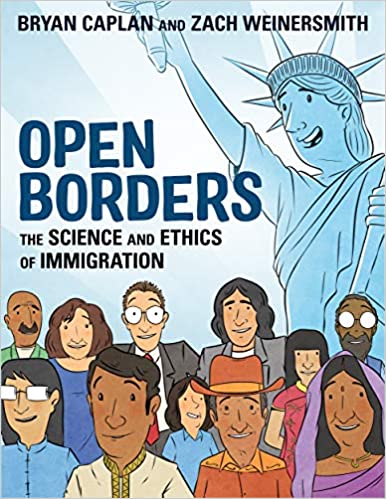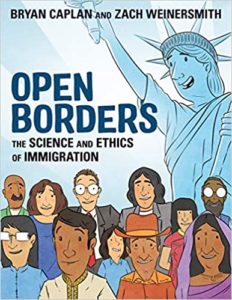

Sam Enright has written a good review of Bryan Caplan’s Open Borders: The Science and Ethics of Immigration. I like it for two main reasons: (1) he takes Bryan completely seriously and doesn’t take cheap shots, and, related to that, (2) the tone is quite nice.
I do have a number of criticisms, but I’ve been thinking about one main one. Enright writes:
I’m also concerned about the animal suffering that would result from open borders. Globally, the production of meat, 90% of which comes from factory farms, creates an almost unimaginable level of suffering. There are two reasons why open borders would make this worse: the Western diet is more meat-heavy than diets from other rich parts of the world, and richer people, in general, consume more animal protein. People sometimes talk about the meat-eater problem: many interventions in global development look much less cost-effective if you give moral concern to animals, since, if the interventions save human lives or make people better off, they lead to greater meat consumption. Increased demand for meat may be unusually harmful now, because it further entrenches factory farming as the default way meat is produced.
At first I found this criticism somewhat persuasive. The recent discussion between Bryan and philosopher Michael Huemer has caused me to be uncomfortable with factory farming and I’m starting to explore ways of eating meat, which I love, without eating meat from factory farms. I don’t buy the idea of rights of animals, but I think it is wrong to raise in animals in circumstances where they suffer for their whole lives.
But as I thought about it, I realized that this is not a good argument at all. Let’s say we could reduce the demand for factory farming by imposing draconian regulations that reduce Americans’ per capita income by 80 percent. Would that justify those regulations? I think not. So then how, if we accept the other parts of Bryan’s argument, can we justify, based on reducing factory farming, draconian immigration restrictions to keep many people’s income 80 percent lower than otherwise. Even if you think regulation is justified to reduce factory farming, shouldn’t the regulation be aimed, not at keeping people poor, but at reducing or ending factory farming?
I’ll have more to say about other parts of the review. But that is my biggest criticism of Enright’s review.

READER COMMENTS
rsm
Oct 26 2021 at 8:38pm
Can vegans form a kind of “wall street bets” retail trader army, corner pork belly futures, and raise the price of meat to $infinity to send you a price signal you can’t refuse?
Isn’t the market already sending you price signals, because plant-based meats are dropping even as meat is reportedly (not buying meat, I wouldn’t know) inflating?
Matthias
Oct 27 2021 at 4:15am
Pork belly futures are a thing of the past.
In any case, increasing the price of meat via financial shenanigans would encourage production (and perhaps short selling of relevant derivatives).
I would assume your goal would be to decrease production?
Jon Murphy
Oct 27 2021 at 8:10am
This proposal runs into the same problem as “predatory pricing.” In order for vegans to corner the pork belly market (though why they would focus exclusively on pork and not other meats and dairy is confusing), they would need to overpay the current owners in order to purchase the assets away from them. Then, as soon as they raised the price above market (never mind to “infinity”), new entrants would come in and sell at a lower price. The vegans, in order maintain their monopoly, would have to offer again an above-market price for the assets. Then, again, as soon as they raise their prices, new entrants would come in. Rinse and repeat. And all this assumes perfect coordination and enforcement among the world’s approximately 80m vegans. That seems a tall order.
David Seltzer
Oct 27 2021 at 1:15pm
Jon, nice explanation. The Hunt brothers tried to corner the silver market. Silver increased from $6.08 an ounce, January 1979, to $49.45 an ounce a year later. The Hunts held between one quarter and one third of silver supply. Trading was halted for lock limits. The COMEX, in response, was to change the margin rules so as to severely restrict leveraged purchases of commodities. The Hunt brothers borrowed heavily. When silver prices collapsed by 50%, they couldn’t meet their margin calls. The capital markets rolled over in panic. I was a market maker on the CBOE and watched first hand as clearing firms greatly increased margin requirements and liquidated traders positions who couldn’t meet the calls. The last thing a clearing firm wanted was an insolvent trader invading their cash.
rsm
Oct 28 2021 at 2:32pm
Did we learn from GME that retailers can engineer gamma squeezes by buying calls in volume? If settlement is immediate (because we have the funds in our accounts and the industry adopts the SEC’s recent recommendations regarding immediate settlement), can we keep prices high (I used pork bellies because of the historical significance, but it could be any and all meat-related futures)? Is the only way to stop this some kind of extra-market action, thus nakedly compromising free market principles?
Matthias
Oct 30 2021 at 12:09am
That’s not what happened with GME. The SEC has a nice investigation published. (And Matt Levine’s Money Stuff gave a nice overview recently.)
In any case, GME ‘should’ have sold stock into the buying frenzy, just like that cinema company did.
GME didn’t sell (much) stock partially because of regulation that restricted them.
Though I don’t see much reason to act either way. A stock going up in value a lot isn’t much of a problem. Perhaps make short selling a bit easier, like the SEC also suggests?
john hare
Oct 27 2021 at 3:50am
People that are more affluent change some of their dietary habits in a way we don’t like, therefore we must prevent them from becoming affluent. Gotcha.
Factory farming being a different subject from holding people down as far as I’m concerned. Affluent people drive polluting cars—buy products from sweatshops—live in big energy eating houses….
Matthias
Oct 27 2021 at 4:19am
David, the issue of factory farming looks like something that would call for a keyhole solution.
See https://openborders.info/keyhole-solutions/ for some other examples.
BC
Oct 27 2021 at 5:41am
I’m reminded of Henry George’s observation, “Both humans and hawks eat chickens — but the more hawks, the fewer chickens; while the more humans, the more chickens.” The chickens and other animals raised on “factory farms” likely wouldn’t exist if it weren’t for those farms. The alternative to factory farms would likely be non-existent animals rather than happier animals. It’s not obvious to me that those animals would prefer non-existence over their life of suffering. For example, would those animals commit suicide if given the chance? I wouldn’t presume on their behalf that they would.
Regardless, David’s argument in the second from last paragraph seems correct. Imagine someone arguing against Civil Rights on the grounds that raising minorities’ incomes would lead to more factory farming. The argument, “Well, if it’s not politically feasible to prioritize animal welfare above American whites’ incomes, maybe we can at least prioritize animal welfare above the incomes of non-Americans or non-whites,” seems deeply flawed.
rsm
Oct 28 2021 at 2:48pm
《It’s not obvious to me that those animals would prefer non-existence over their life of suffering. For example, would those animals commit suicide if given the chance? I wouldn’t presume on their behalf that they would.》
How about you let animals decide if they want to go into the slaughterhouse, or not?
David Henderson
Oct 28 2021 at 7:23pm
You write:
That question can make sense in some contexts but not as a response to BC’s point. For the animals to decide, they already have to be alive. Take another look at BC’s point.
Thomas Lee Hutcheson
Oct 27 2021 at 8:24am
It is similar to the argument that we should prevent economic growth because growth causes a harmful increase in the concentration of CO2 in the atmosphere.
What the best way of reducing animal sufferings is a good question, but the answer is almost certainly not to restrict immigration.
KevinDC
Oct 27 2021 at 9:03am
There’s another possibility Enright overlooks. He points out that the Western diet is more meat-heavy than other diets, and worries that more immigrants into Western society would mean more people eating a meat-heavy diet. But it’s not a forgone conclusion that “more immigrants into Western nations” = “more people eating Western style diets.” It can also be the case that it leads to more Westerners eating non-Western foods and cuisines. It’s possible that these immigrants would introduce more of their meatless or meat-light cuisine into Western society, and increase the number of options available for people who wish to avoid meat.
When Michael Huemer and Bryan Caplan first publicly debated ethical vegetarianism several years ago, I was persuaded by Huemer to give up on eating meat. For a bit, this left me flailing on what kind of food to make – so much of my diet was based on meat that I wasn’t sure what to do. When researching recipes, I noticed that almost all of the really good vegetarian and vegan recipes I was finding were what you might call foreign dishes. And when I’m traveling, if I pull up Yelp to look for a restaurant with vegetarian and vegan options, most of the results that come up are ethnic restaurants. If Enright thinks it’s morally important that people not eat meat from factory farms (and I agree!) then movement in that direction will be helped by having additional substitutes available. The more delicious meat-free dishes people have available, the less difficult it is to give up eating meat. As for my own experience, I get just as many if not more “food-utils”* now as I did when I was a meat eater, I just get them from different foods. And the cuisines imported into America by immigrants have a lot to do with that.
*I’m pretty sure this isn’t a real term but it totally should be.
Sam Enright
Oct 29 2021 at 10:38am
Hello,
I’m the guy who wrote the original post. Thanks for responding to it! I wrote a comment response post in which I discussed the best comments I got, including a discussion of this post (close to the start): https://samenright.com/2021/10/29/response-to-the-comments-on-open-borders/.
Sam
Comments are closed.